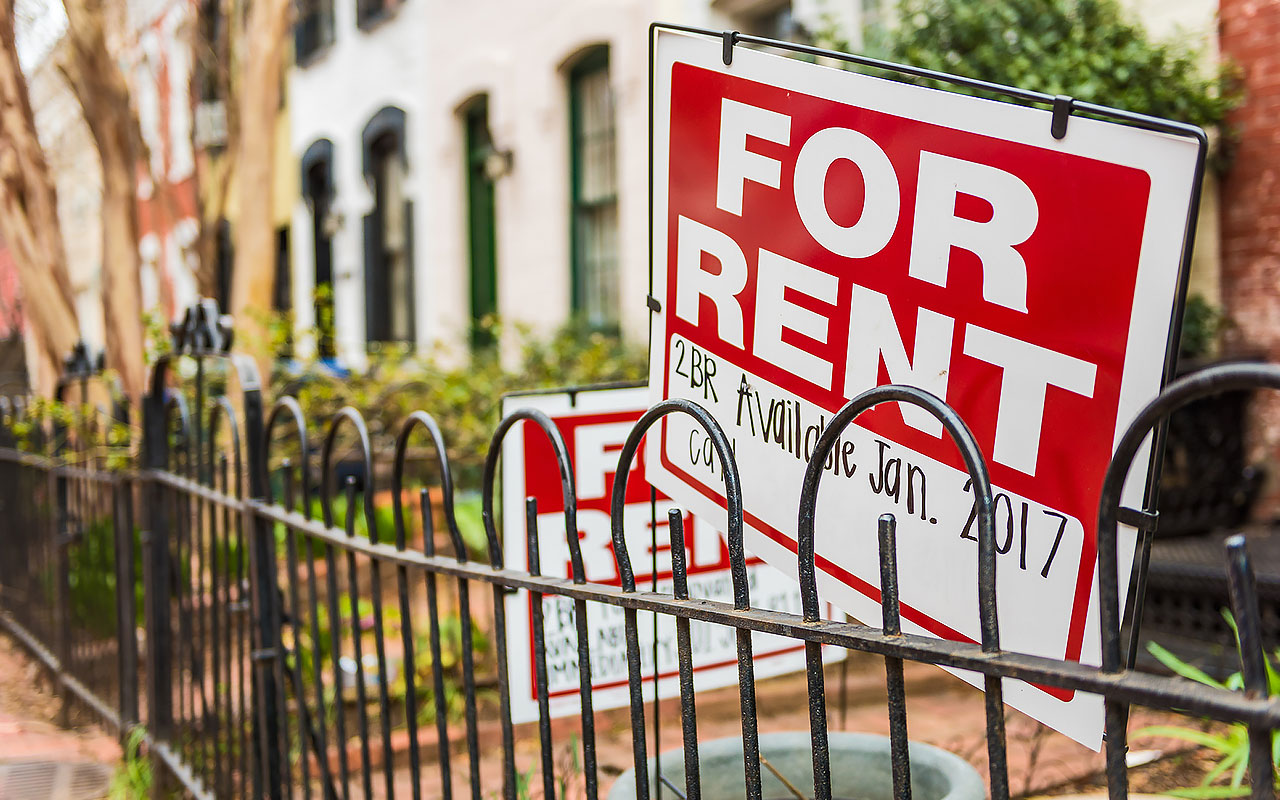10 Housing REITs to Buy for the “Rise of the Renters”
The number of Americans who prefer renting to home ownership is rapidly rising.


Profit and prosper with the best of Kiplinger's advice on investing, taxes, retirement, personal finance and much more. Delivered daily. Enter your email in the box and click Sign Me Up.
You are now subscribed
Your newsletter sign-up was successful
Want to add more newsletters?

Delivered daily
Kiplinger Today
Profit and prosper with the best of Kiplinger's advice on investing, taxes, retirement, personal finance and much more delivered daily. Smart money moves start here.

Sent five days a week
Kiplinger A Step Ahead
Get practical help to make better financial decisions in your everyday life, from spending to savings on top deals.

Delivered daily
Kiplinger Closing Bell
Get today's biggest financial and investing headlines delivered to your inbox every day the U.S. stock market is open.

Sent twice a week
Kiplinger Adviser Intel
Financial pros across the country share best practices and fresh tactics to preserve and grow your wealth.

Delivered weekly
Kiplinger Tax Tips
Trim your federal and state tax bills with practical tax-planning and tax-cutting strategies.

Sent twice a week
Kiplinger Retirement Tips
Your twice-a-week guide to planning and enjoying a financially secure and richly rewarding retirement

Sent bimonthly.
Kiplinger Adviser Angle
Insights for advisers, wealth managers and other financial professionals.

Sent twice a week
Kiplinger Investing Weekly
Your twice-a-week roundup of promising stocks, funds, companies and industries you should consider, ones you should avoid, and why.

Sent weekly for six weeks
Kiplinger Invest for Retirement
Your step-by-step six-part series on how to invest for retirement, from devising a successful strategy to exactly which investments to choose.
The number of Americans who prefer renting to home ownership is rapidly rising. According to analysis by Pew Research Center, renter households currently represent nearly 37% of all American households – the highest percentage in 50 years and up from 31% just 10 years ago. That means big things for housing real estate investment trusts (REITs).
Home ownership once was the dream of every American, but attitudes have shifted since the 2008 housing market crash, particularly among young adults. The change may be the result of steadily increasing home prices, accompanied by wage growth that hasn’t kept pace with inflation. Affordable housing has become an issue for many Americans, especially those living on the coasts, where high-end homes may sell for millions of dollars.
America’s changing attitude toward home ownership is apparent from the results of a recent Freddy Mac survey, which showed 75% of Generation Xers, 76% of Millennials and 82% of Baby Boomers presently believe renting is a better option than buying. Affordability was the main reason these demographics preferred renting, but not the only reason. High costs of home maintenance and greater convenience and flexibility were also cited among reasons for renting.
Most economists think home prices will continue to rise in 2018. This suggests the trend favoring renting is unlikely to reverse anytime soon. Also, the Federal Reserve is signaling multiple rate hikes this year, which should increase mortgage rates, meaning fewer Americans will be able to afford a home.
These 10 housing REITs are not only poised to benefit from the renter culture, but also offer predictable growth and attractive dividend yields.
Data is as of Feb. 8, 2018. Companies are listed in alphabetical order. Dividend yields are calculated by annualizing the most recent quarterly payout and dividing by the share price. Click on ticker-symbol links in each slide for current share prices and more.

Mid-America Apartment Communities
- Market value: $9.7 billion
- Dividend yield: 4.0%
- 5-year dividend CAGR: 5.7%
- Mid-America Apartment Communities (MAA, $85.39) acquires and operates apartment communities across the Sunbelt. At present, the REIT owns nearly 101,000 apartment units and has a presence in 37 markets across 17 states and the District of Columbia. MAA is especially strong in faster-growing secondary markets such as Atlanta, Dallas and Charlotte. These markets are attracting new residents with job growth that is 50% higher than the national average.
The REIT is an effective manager with operating expenses per property well below industry peers. In 2017, MAA expects to generate at least $100 million of extra cash after making capital expenditures and dividend payments. This excess cash provides Mid-America with plenty of dry powder for future acquisitions and dividend growth.
Mid-America Apartment Communities’ AFFO (adjusted funds from operations – an important operational metric for REITs) payout ratio ranges around 66% and provides a comfortable cushion for covering dividends during industry downturns. Those dividends, by the way, have increased every year since 2010. Increased buying by insiders is a positive signal for investors, as is a January upgrade by Stifel Nicholas from “Hold” to “Buy.”

Equity Residential
- Market value: $20.3 billion
- Dividend yield: 3.5%
- 5-year dividend CAGR: 8.4%
- Equity Residential (EQR, $55.26) is the country’s largest apartment REIT. The company owns 77,498 apartment units across 302 properties. EQR buys properties in densely populated coastal markets characterized by higher-than-average housing costs. The REIT’s core markets, which include Seattle, San Francisco, southern California, Boston, New York and D.C., deliver rent growth 34% above the national average.
Strong demand has caused the value of EQR’s properties to soar. Since 2001, property values in the REIT’s markets have risen 7.3% per year, versus 5.5% annual gains in other markets.
Equity Residential offers one of the industry’s best balance sheets; the company has investment-grade credit ratings of “A3” from Moody’s and “A-” from Standard & Poor’s. Moreover, the REIT has a unique dividend structure that pegs payout at 65% of management’s FFO guidance. As a result, dividends may fluctuate slightly year to year. But over the past decade, EQR has yielded about 3.7% on average.
Evercore ISI analyst Steve Sakwa was among a trio of analysts to upgrade EQR over the past few months, with Sakwa touting the company’s favorable relative valuation.

Essex Property Trust
- Market value: $14.4 billion
- Dividend yield: 3.2%
- 5-year dividend CAGR: 8.4%
- Essex Property Trust (ESS, $218.28) is the only major apartment REIT that focuses exclusively on West Coast properties. The company owns interests in 247 properties and 60,305 apartment units and operates in northern and southern California and Washington state.
Thanks to a large presence in northern California, this REIT has been able to grow income faster than its peers. Better still, analysts think northern California will be the nation’s top-performing rental market in 2018-19.
Essex Property Trust has produced the best shareholder returns in the multifamily REIT sector over the past 20 years, and boasts the highest total return of all publicly traded U.S. REITs since it went public in 1994.
The company also has a 23-year track record of rising dividends. Looking forward, the company’s modest payout ratio (59%) enhances the safety of the dividend and boosts prospects for future dividend growth.

Sun Communities
- Market value: $6.7 billion
- Dividend yield: 3.1%
- 5-year dividend CAGR: 1.3%
- Sun Communities (SUI, $83.96) is in fact not a rental play, but one that enjoys the same tailwind in that it provides a solution to the rise of expensive homeownership. Sun is the country’s leading owner/operator of manufactured-housing communities, boasting 349 housing communities across 29 states and Canada. The company leases parcels of land to residents, as well as sells and leases new or pre-owned manufactured homes.
Manufactured housing is one of the most resilient real estate sectors given its low costs. Retirees are attracted to manufactured housing by its affordability. Once established in a Sun community, residents rarely move. The average tenure for its residents is 13 years.
This longevity provides the REIT with sizable recurring revenues, which has allowed SUI to make dividend payments on an uninterrupted basis for 23 years in a row, without any cuts, and occasional (though not necessarily consistent) income growth along the way.
Sun Communities’ dividend growth over the past few years has been hampered by its aggressive acquisitions, with the REIT purchasing more than $4.4 billion in assets since 2012, nearly doubling the size of its holdings. Still, its FFO payout ratio is low at 65%, which suggests a secure dividend with room to grow. And Baird analyst Drew Babin believes last year’s expansion projects should fuel growth for several years, starting in 2018.

Apartment Investment & Management Company
- Market value: $6.0 billion
- Dividend yield: 3.7%
- 5-year dividend CAGR: 13.6%
- Apartment Investment & Management Company (AIV, $38.21), also known as AIMCO, buys properties in second-tier markets such as Denver, Philadelphia and Miami that produce rent growth similar to first-tier market such as New York and Boston. This REIT owns interests in 187 properties and operates in 22 states and D.C.
The REIT is diversified both geographically and by price point, enabling it to attract a broader mix of renters. The portfolio is a 50/50 mix of Class A and Class B/C properties. Class A properties are the newest buildings with the highest rents, whereas Class B/C properties are generally older and have fewer amenities.
AIMCO upgrades by selling up to 10% of its portfolio each year and reinvesting in better-quality properties that support higher rents. In the past three years, the REIT has sold $1.6 billion of assets and reinvested the proceeds in property upgrades, new development and acquisitions.
The REIT has increased the dividend every year since 2011, including a 9.1% hike in 2017 and 5.6% this year. At just 58% of FFO, the payout leaves an ample cushion for additional gains.

Equity Lifestyle Properties
- Market value: $7.2 billion
- Dividend yield: 2.4%
- 5-year dividend CAGR: 17.0%
- Equity Lifestyle Properties (ELS, $81.55) is another manufactured-housing REIT that caters primarily to retirees and vacationers. Nearly half of the REIT’s properties have ocean, lake or river frontage or are located within 10 miles of a coast.
Equity Lifestyle residents own their homes and lease sites from the REIT. The company purchases properties in prime resort destinations on the Florida, Georgia and Texas coasts and adds sought-after amenities to its communities such as fitness centers and clubhouses.
Due to its focus on retirees, ELS benefits from the aging of the Baby Boomers. Roughly 10,000 Baby Boomers will reach retirement age each day over the next 13 years, according to the Pew Research Center.
The REIT owns 404 properties and 149,500 sites across 32 states and Canada. Approximately one-third of its portfolio is in Florida. While some Florida properties suffered damage during Hurricane Irma last year, ELS expects any losses to be covered by business insurance.
The company has an exceptional track record for improving shareholder returns and has outperformed the Standard & Poor’s 500-stock index over five-fold since its IPO 25 years ago. Better still, Equity Lifestyle raised its dividend 13% this year, and long-term, dividend growth has been more than twice that of some peers.

AvalonBay Communities
- Market value: $21.4 billion
- Dividend yield: 3.6%
- 5-year dividend CAGR: 5.6%
- AvalonBay Communities (AVB, $154.94) owns upscale urban properties that appeal to millennial renters. The millennial generation is 75 million strong and recently overtook Baby Boomers as America’s largest demographic group. A preference by Millennials for renting rather than buying bodes well for this REIT’s future growth.
AVB owns 286 properties and 82,964 apartment units across 11 states and the District of Columbia. The company has a particularly strong presence in high-demand markets such as New England, the New York/New Jersey metro area, the Mid-Atlantic, the Pacific Northwest and northern and southern California.
AvalonBay addresses various segments of the renter market with three distinct brands – Avalon, AVA and Eaves by Avalon, which also allow AVB to reach new customers and more deeply penetrate core markets. The company also should benefit from less competitive new supply, UBS analyst Nick Yulico said in November 2017 as part of a note upgrading the stock to “Buy.”
This REIT has paid dividends 23 years in a row, but while it does boast long-term dividend growth, payout hikes are not an annual affair. That said, AVB did improve the dividend by 5.2% in 2017.

UDR Inc.
- Market value: $8.8 billion
- Dividend yield: 3.7%
- 5-year dividend CAGR: 7.1%
- UDR Inc. (UDR, $32.92) owns properties in top-tier markets such as Washington DC, the San Francisco Bay area and Orange County in California, New York City and Boston. The company owns interests in 167 properties and 50,127 apartment units.
A diverse property mix gives UDR a competitive advantage in attracting renters. The REIT holds a 50/50 mix of Class A/B and urban and suburban properties.
The company’s preferred growth strategy is new development. UDR targets an annual development pipeline at $900 million to $1.4 billion – a size that can be fully funded by free cash flow and modest asset sales.
UDR is a longtime dividend payer, too, having distributed cash to shareholders for 45 consecutive years. Most recently, it upped its payout by 5.1% in 2017, to 31 cents per share.

Camden Property Trust
- Market value: $7.3 billion
- Dividend yield: 3.7%
- 5-year dividend CAGR: 8.5%
- Camden Property Trust (CPT, $78.78) has a major presence in the Sunbelt. The REIT’s primary markets – which include Dallas, Houston, Atlanta, southern Florida and southern California – benefit from net migration trends and higher-than-average employment growth.
CPT, which operates 156 properties and 54,038 apartment units, has significantly improved the quality of its assets since 2011, using the proceeds from property sales to fund re-development and acquisitions. Portfolio upgrades have helped produce a 60% improvement in revenues per apartment, which rose from $1,042 to $1,674 a month between 2011 and 2017.
Camden’s latest dividend increase was 7.1% in 2016, when the REIT also rewarded investors with a $4.25-per-share special cash dividend. This was in addition to its regular $3-per-share annual dividend.

Independence Realty Trust
- Market value: $699.0 million
- Dividend yield: 8.4%
- 5-year dividend CAGR: 3.1%
- Independence Realty Trust (IRT, $8.37) invests in Class B properties in second-tier markets such as Columbus, Louisville, Memphis and Raleigh. The potential for success comes from the fact that rental demand in these markets is steadily rising because new-apartment construction hasn’t kept pace with demand.
IRT is unusual among apartment REITs in focusing exclusively on Class B properties. The majority of new supply coming online is Class A properties concentrated in markets like Los Angeles and New York. At present, vacancies in the Class B segment are near historic lows and continue to decline.
Independence Realty has upgraded its portfolio over the past five years while simultaneously expanding its property count more than six-fold. The acquisition of nine properties last September increases the REIT’s portfolio to 54 properties and 14,733 apartment units. These improvements have paid off with a 26% increase in average rents and a 10-year reduction in the average age of its properties.
IRT is perhaps the most speculative offering on this list. On the one hand, it offers the highest yield in the apartment REIT sector, but also one of the riskier balance sheets. Meanwhile, the company began paying dividends in 2011 – on a monthly basis, though it’s switching to a quarterly payout this year – but hasn’t raised the dividend in four years and is not committed to dividend hikes.
Profit and prosper with the best of Kiplinger's advice on investing, taxes, retirement, personal finance and much more. Delivered daily. Enter your email in the box and click Sign Me Up.

Lisa currently serves as an equity research analyst for Singular Research covering small-cap healthcare, medical device and broadcast media stocks.
-
 Dow Adds 1,206 Points to Top 50,000: Stock Market Today
Dow Adds 1,206 Points to Top 50,000: Stock Market TodayThe S&P 500 and Nasdaq also had strong finishes to a volatile week, with beaten-down tech stocks outperforming.
-
 Ask the Tax Editor: Federal Income Tax Deductions
Ask the Tax Editor: Federal Income Tax DeductionsAsk the Editor In this week's Ask the Editor Q&A, Joy Taylor answers questions on federal income tax deductions
-
 States With No-Fault Car Insurance Laws (and How No-Fault Car Insurance Works)
States With No-Fault Car Insurance Laws (and How No-Fault Car Insurance Works)A breakdown of the confusing rules around no-fault car insurance in every state where it exists.
-
 The 24 Cheapest Places To Retire in the US
The 24 Cheapest Places To Retire in the USWhen you're trying to balance a fixed income with an enjoyable retirement, the cost of living is a crucial factor to consider. Is your city the best?
-
 Bond Basics: U.S. Agency Bonds
Bond Basics: U.S. Agency Bondsinvesting These investments are close enough to government bonds in terms of safety, but make sure you're aware of the risks.
-
 5 Stocks to Sell or Avoid Now
5 Stocks to Sell or Avoid Nowstocks to sell In a difficult market like this, weak positions can get even weaker. Wall Street analysts believe these five stocks should be near the front of your sell list.
-
 Best Stocks for Rising Interest Rates
Best Stocks for Rising Interest Ratesstocks The Federal Reserve has been aggressive in its rate hiking, and there's a chance it's not done yet. Here are eight of the best stocks for rising interest rates.
-
 The Five Safest Vanguard Funds to Own in a Volatile Market
The Five Safest Vanguard Funds to Own in a Volatile Marketrecession The safest Vanguard funds can help prepare investors for market tumult but without high fees.
-
 The 5 Best Inflation-Proof Stocks
The 5 Best Inflation-Proof Stocksstocks Higher prices have been a major headache for investors, but these best inflation-proof stocks could help ease the impact.
-
 5 of the Best Preferred Stock ETFs for High and Stable Dividends
5 of the Best Preferred Stock ETFs for High and Stable DividendsETFs The best preferred stock ETFs allow you to reduce your risk by investing in baskets of preferred stocks.
-
 What Happens When the Retirement Honeymoon Phase Is Over?
What Happens When the Retirement Honeymoon Phase Is Over?In the early days, all is fun and exciting, but after a while, it may seem to some like they’ve lost as much as they’ve gained. What then?
